
Informal Briefing Form for Pro Se Appeals from District
Appeal: 14-1885 Doc: 17 Filed: 10/07/2014 Pg: 1 of 4 UNITED STATES COURT OF APPEALS FOR THE FOURTH CIRCUIT DIRECTIONS FOR INFORMAL BRIEF 1. Preparation of Brief. The Court will consider this case according to the written issues, facts, and arguments presented in the Informal Briefs. Space is provided to present up to four issues. Additional issues may be presented by attaching addtional sheets. The Court will not consider issues that are not specifically raised in the Informal Briefs. Informal Briefs must be legible and concise, and any attached pages must be sequentially numbered. Informal Briefs may be filed on the form provided or in memorandum or formal briefing format. 2. Copies required. * File the original of the Informal Brief with the Court. If you would like a filestamped copy returned, send an extra copy and a self-addressed stamped envelope. The Court’s address is: Clerk U.S. Court of Appeals, Fourth Circuit U.S. Courthouse Annex, 5th Floor 1100 East Main Street Richmond, VA 23219 * Send one copy of your Informal Brief to each of the parties in the case. 3. Certificate of Service Required. You must certify that you sent each of the other parties or attorneys complete copies of all documents you send the Court. Service on a party represented by counsel shall be made on counsel. 4. Signature Required. You must sign your Informal Brief and all Certificates of Service. If the Informal Brief is not signed, the case will be subject to dismissal under this Court’s Local Rule 45. DOCUMENTS ARE SCANNED INTO ELECTRONIC FORM AND POSTED TO THE DOCKET. DO NOT USE STAPLES, TAPE OR BINDING. 06/25/14 SCC Appeal: 14-1885 Doc: 17 Filed: 10/07/2014 Pg: 2 of 4 UNITED STATES COURT OF APPEALS FOR THE FOURTH CIRCUIT INFORMAL BRIEF RE: 14-1885, Yamassee Indian Tribe v. Allendale County Government, et al (1:13-cv-01577-TLW) 1. Jurisdiction (for appellants/petitioners only) A. Name of the court or agency from which review is sought: B. Date(s) of the order or orders for which review is sought: 2. Timeliness of notice of appeal or petition for review (for prisoners only) Exact date on which notice of appeal or petition for review was placed in institution’s internal mailing system for mailing to court: 3. Issues for Review Use the following spaces to set forth the facts and argument in support of the issues you wish the Court of Appeals to consider. The parties may cite case law, but citations are not required. Issue 1. The District Court properly dismissed the case as improperly filed by a non-attorney on behalf of an alleged entity not entitled to appear pro se, where the Appellant is neither an individual nor a federally-recognized Indian Tribe. Supporting Facts and Argument. The Appellant is not a federally recognized Indian Tribe. 25 USC 479; 78 Fed. Reg. 26385-26389 (July 17, 2014). The District Court properly dismissed a case filed by non-attorney individuals on behalf of an entity which is neither an individual nor a federally recognized Indian Tribe. In the United States District Court, an individual may appear pro se, but a business entity may not. The Appellant clarified in interrogatory responses to the Court that it is a public charity registered with the South Carolina Secretary of State (although this Court may take judicial notice the registration is currently suspended as delinquent), not federally recognized, and "has no desire to be such." Doc 20 at 5. Whether or not it is possible to be an indian tribe without recognition by the federal government, the only Indian Tribes which can be represented in federal courts by their non-attorney leaders are those with federal recognition. Kahawaiolaa v. Norton, 386 F.3d 1271, 1273 (9th Cir. 2004). The privilege of appearing pro se is extended based on a federally recognized Indian Tribe's "distinct combination of sovereignty and dependency, as a ward of the state. Fraas Survival Systems v. Absentee Shawnee Economic Development Authority, 817 F. Supp. 7 (S.D.N.Y. 1993). Federal courts may further look to the state courts to determine whether a litigant may appear pro se. If Plaintiff is an entity, it may not appear pro se under South Carolina law, but can only appear through an attorney. See Doe v. McMaster, 355 S.C. 306, 585 S.E.2d 773 (2003); Renaissance Enters., Inc., v. Summit, 334 S.C. 649, 515 S.E.2d 257 (1999); State v. Wells, 191 S.E.2d 468, 5 S.E.2d 181 (1939). Northeast Woodland-Coos Tribe v. Department of Social Services, 1993 WL 35262 (D.C.Ma. 1993), did not resolve any issue of tribal status, but was a three paragraph order striking motions for nonservice. The dismissal without prejudice was proper and should be affirmed. Appeal: 14-1885 Doc: 17 Filed: 10/07/2014 Pg: 3 of 4 Issue 2. The District Court properly dismissed the case for lack of subject matter jurisidiction, where there was neither diversity jurisdiction nor a valid and viable federal question to be resolved. Supporting Facts and Argument. This case presents no diversity jurisdiction, nor does it turn on a question of federal law. The Appellant continues to assert RICO among its claims, but that and many other frivolous claims (including criminal statutes giving rise to no private right of civil action) were stricken by the Court on July 18, 2014, by an Order (Doc 75) on Appellees' Motion to Strike. That Order was not appealed, and is the law of the case. What was left was Appellant's claim that it was deprived of an interest in a parcel of land, a state law, not federal law, issue. (Appellees refuted the claim in their memoranda in support of their Motion to Dismiss and in opposition to Appellees' Motion for Summary Judgment, showing that, if Appellant is an entity which can own land, it continues to own the one-half interest it acquired from its grantor, who had no authority to make a grant of the interest of Appellee Brantley. The merits were not reached, however.) Dismissal for lack of subject matter jurisdiction was proper. Issue 3. The issue of standing to sue was not decided in the lower court, and should not be entertained on appeal. Supporting Facts and Argument. The District Court specifically declined to rule on standing to sue. An issue not decided in the lower court should not be entertained on appeal. The question of standing played no role in the dismissal of this case without prejudice. The case was dismissed as one filed by a non-lawyer on behalf of an alleged entity not entitled to appear pro se, and was further dismissed for lack of subject matter jurisdiction where there was neither diversity of citizenship nor a central and critical question of federal law. Issue 4. Supporting Facts and Argument Appeal: 14-1885 4. Doc: 17 Filed: 10/07/2014 Pg: 4 of 4 Relief Requested Identify the precise action you want the Court of Appeals to take: The Court should affirm the decision of the District Court. 5. Prior appeals (for appellants only) A. Have you filed other cases in this court? Yes No B. If you checked YES, what are the case names and docket numbers for those appeals and what was the ultimate disposition of each? s/Norma A. T. Jett Signature [Notarization Not Required] Norma A. T. Jett, Attorney for Appellees [Please Print Your Name Here] CERTIFICATE OF SERVICE ************************** I certify that on October 7, 2014 parties, addressed as shown below: Yamassee Indian Tribe PO Box 693 Allendale, SC 29810 I served a complete copy of this Informal Brief on all Angus Macaulay Lawton, Esquire Erica Bedenbaugh McElreath, Esquire Jared Cyle Williams, Esquire Lawton Law Office, LLC 496 Bramson Court, Ste 100 Mount Pleasant, SC 29464 s/Norma A. T. Jett Signature NO STAPLES, TAPE OR BINDING PLEASE Reset Form
© Copyright 2026
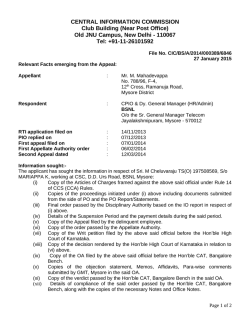
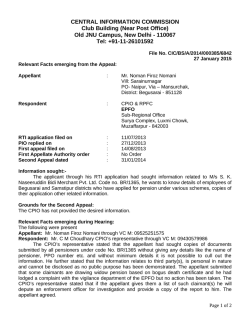
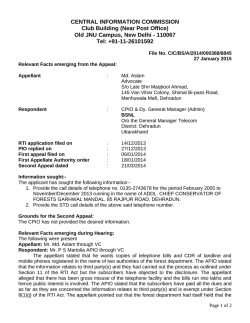
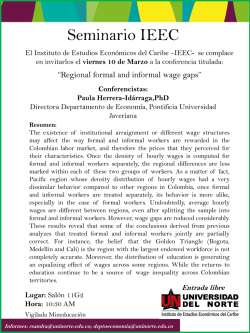
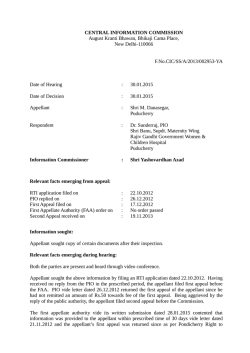
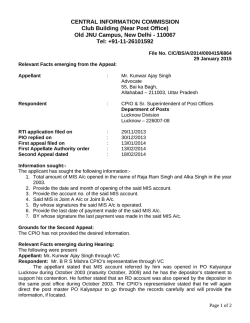
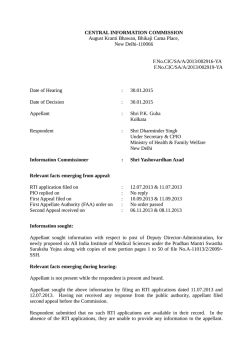
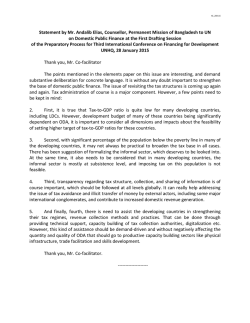
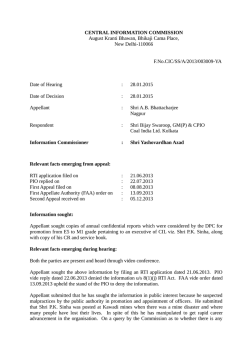
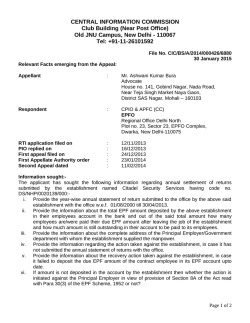
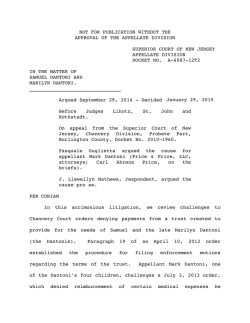
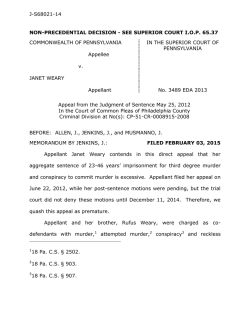
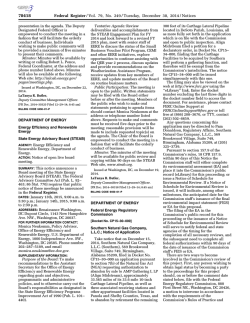
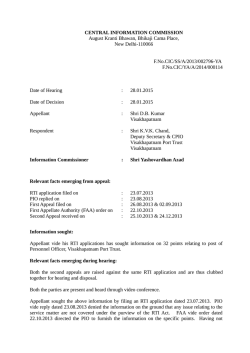
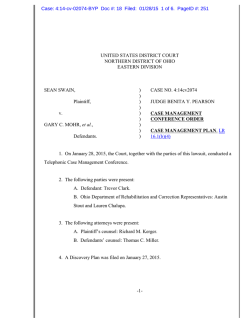
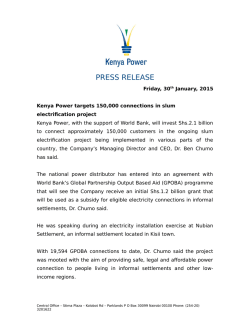
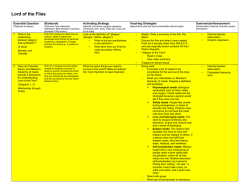
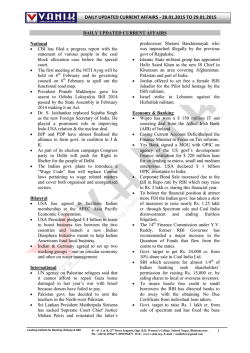
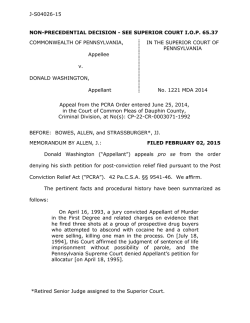
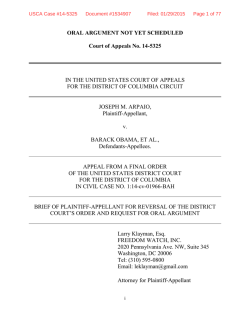
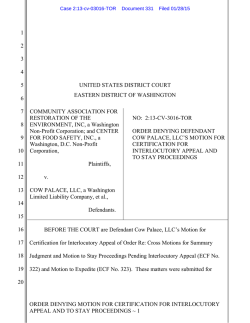
![[2012] EWHC 3562 (Admin)](http://s2.esdocs.com/store/data/000499536_1-05daedd8939bf57bbcd21a7cbe6d4c84-250x500.png)